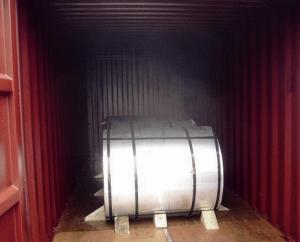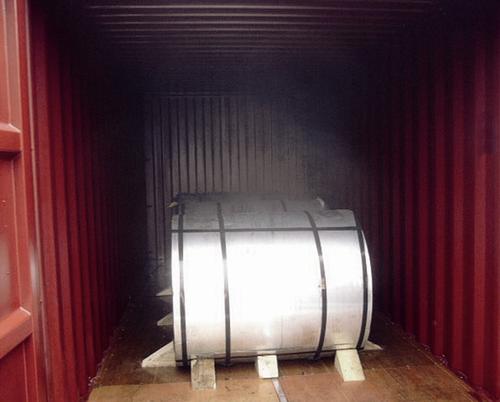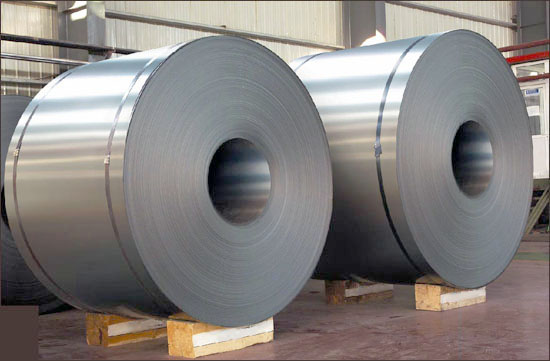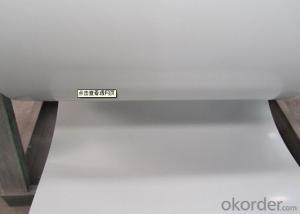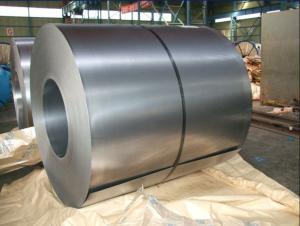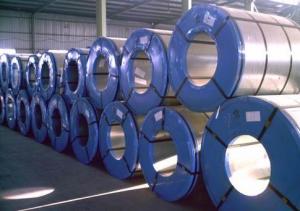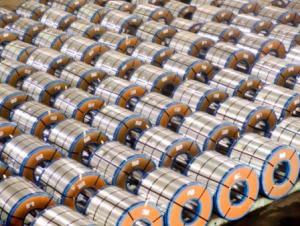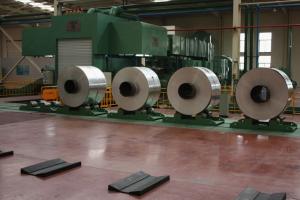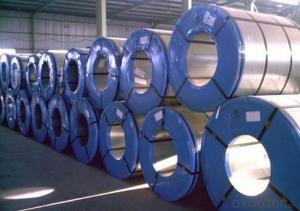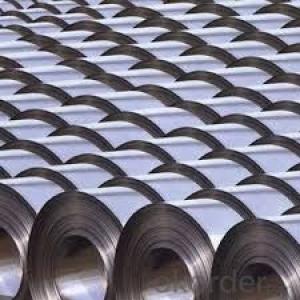Matt Finish Cold Rolled Steel-JIS G3141 SPCC-1
- Loading Port:
- Tianjin
- Payment Terms:
- TT OR LC
- Min Order Qty:
- -
- Supply Capability:
- 4000吨 m.t./month
OKorder Service Pledge
OKorder Financial Service
You Might Also Like
SPECIFICATION
1) Capacity: about10,000 ton per month for steel strip/tape product
2) Thickness: from 0.20mm to 3.5mm, all available.
3) Width: from 15mm to 600mm, all available.
4) Grade: Q195, SGCC, DX51D
5) Coil weight: from 50kg to 7000kg, all available.
6) Coil ID: 100mm - 508mm
7) Coil OD:500mm-1300mm
9) Tensile strength: 28.1-49.2kgf/mm2
10) Zinc coating weight: Min. 60g/m2, double side
11) Spangle: regular spangle, minimized spangle, zero spangle
12) Surface treatment: chemical passivating treatment, oils,passivating oils
13) Min trial order 5ton each thickness, 1 x 20' per delivery
14) Components: C%≤ 0.07, Si%≤0.03, Mn% ≤ 0.50, P% ≤ 0.025,S% ≤ 0.025, Alt% ≥ 0.02
It is the basedmaterial for galvanized steel coil and pre-painted galvanized steel coil. It iswidely used in light industry for making tank, furniture, pipe, refrigerators,washers, freezer plate, air conditioner, micro-wave oven, water heater,soot-such machine, electric rice cooker, electric roaster oven, dryers andautomobile etc. In the other application industries, it’s mainly used forenameling, office furniture, burglarproof door, electronic element, fastenerbattery, hardware, automotive fitting etc.
Eye to sky package: Anti-damp paper inside fullwrapped with plastic film, iron sheet outside on wooden pallet in 20 feetcontainer with 25mt.
- Q: Ok I have a neodymium magnet, stuck to my fridge holding a old bottle cap opener for my beer it works fine. At the local rummage sale there was a beautiful cap opener my freind was selling for $0.25 she said had never beenUsed it was like 40 years old it is made a stainless steel. The magnet will not stick to it. I don't understand this looked this up and certain steels are not magnetic, I tried a experiment with my compass it don't point north as should it follows the bottle opener as I move it around it. If not magnetic why is this happening? Also tried placing near another neodymium magnet with a pull of about 200 lbs. Not I tiny bit of attraction to the metal. If so why is the tiny magnet in the compass attracted to it. But not a huge powerfull magnet.
- That's interesting that it caused deflection in the compass. A lot of stainless steels may be SLIGHTLY magnetic, because they have small amounts of ferrite or alpha-iron in them. Ferrite is one of the crystal phases of steel. It has a body-centered cubic (BCC) structure and it's responsible for the magnetism of ordinary steels. Adding certain elements like nickel, manganese, or molybdenum, changes the crystal structure of the steel to a face-centered cubic (FCC) structure, which is NOT magnetic. This crystal phase is known as Austenite or gamma-iron. However most iron alloys contain some impurities that may cause the steel to be not completely transformed into the FCC austenite phase, small areas remain as ferrite.
- Q: i'm looking into buying a stainless steel ring for somebody as a gift.i'm on a budget (heh) and the ring is about $50.will it rust or tarnish? it'd be embarrassing if i gave it to someone, and it begins rusting :Pthanks
- Stainless Steel does not rust...that is why it is used in our kitchens and the top kitchens of the world...!! sorry...Stainless Steel does not Tarnish either!
- Q: What are the common quality control measures for steel coils?
- Some common quality control measures for steel coils include inspection for surface defects such as scratches, dents, or unevenness, checking for dimensional accuracy and thickness consistency, testing for mechanical properties such as tensile strength and hardness, conducting chemical composition analysis, and ensuring proper packaging and labeling of the coils.
- Q: How can I tell the wear resistance, strength, ect from the name of the steel?how could I tell the difference between 420 and 440 steel. what does the HC in 420 HC steel mean? what do the numbers and letters in s30v steel mean?
- Larry gave a good answer. As for the HC, it means High Carbon.
- Q: basically a builder told us steel is good but when we got MFI, BQ they only have acrylic
- Steel and cast iron are the premium types of tubs. Acrylic will scratch and dull if you don't use proper cleaners. If they are not installed with the proper support, they will flex and tear loose the caulking around the edges.
- Q: I want to start getting throwing knives and i was wondering what material is best for quality, but still cheap. I also saw some 440 stainless steel knives that i liked and wanted to know if the material was good
- Stainless Steel Throwing Knives
- Q: Can steel coils be stored in a corrosive environment?
- Ideally, steel coils should not be stored in a corrosive environment as exposure to corrosive elements can lead to degradation and damage to the steel surface. Corrosion can weaken the structural integrity of the coils and affect their performance. To ensure the longevity and quality of the steel coils, it is best to store them in a dry and non-corrosive environment.
- Q: How are steel coils packaged for shipment?
- Steel coils are typically packaged for shipment by being tightly wound and secured with steel bands or straps. They are often placed on wooden skids or pallets to provide stability and protection during transportation. Additionally, protective covers or sheets may be used to shield the coils from moisture and other potential damages.
- Q: hi i was doing a little history project on guns. i was just wondering if anyone could help me find out what material was used before steel and why this material wasnt as good as steel ( its faults)thanks for your help
- The most common was bronze, which was the strongest material that could be cast, at least until the industrial revolution. Until that time, furnaces which could reach temperatures hot enough to melt steel did not exist. The only way to work with steel would have been forging, which means hammering it into shape while red-rot. Obviously, this is not a very practical method for making large thick-walled cannons (though it was done on occasion. Small arms such as pistols and muskets could be easily made of steel by hand forging.) The most practical way to make cannons was pouring molten bronze which melts at significantly lower temperature than steel. Cast iron was also used. Note that Cast Iron contains 3%-7% carbon, compared to steel which only contains between 2% to 0.2% carbon. Due to the excessive carbon content of cast iron, it's melting point is about 500 degrees lower than steel enabling it to be melted with pre-industrial furnaces. Unfortunately, cast iron is also brittle, unlike steel or bronze. This means that a defective or cracked casting could easily explode, sending iron shrapnel everywhere. (Also, maiming and killing the gun crew, an experienced gun crew was as valuable as the cannon itself!) For this reason. Cast iron cannon were usually considered a cheap, risky alternative to expensive but durable bronze.
- Q: Can i make holes in iron and steel with somekind of drill bit. All i have is metal drill bits. Mabey like 68 of them but i dont know wich one to use and if they will penetrate.
- Drills are used to make holes in steel all the time.
Send your message to us
Matt Finish Cold Rolled Steel-JIS G3141 SPCC-1
- Loading Port:
- Tianjin
- Payment Terms:
- TT OR LC
- Min Order Qty:
- -
- Supply Capability:
- 4000吨 m.t./month
OKorder Service Pledge
OKorder Financial Service
Similar products
Hot products
Hot Searches
Related keywords
